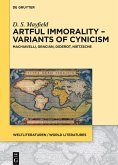Close readings of textual sources commonly deemed cynical provide a legible starting point. A rhetorical analysis of aphorisms ascribed to the arch-Cynic Diogenes facilitates describing the design of cynical statements, as well as the characteristic features of the cynical stance. These patterns are identifiable in later texts generally labeled cynical - above all in Machiavelli's Principe. With recourse to the Diogenical archetype, cynicism is likewise rendered describable in Gracián's Oráculo manual, Diderot's Le neveu de Rameau, and Nietzsche's Posthumous Fragments.
This study's description of cynicism provides a phenomenon otherwise considered amorphous with distinct contours, renders transparent its workings, and tenders a dependable basis for further analyses.
Dieser Download kann aus rechtlichen Gründen nur mit Rechnungsadresse in A, B, BG, CY, CZ, D, DK, EW, E, FIN, F, GR, HR, H, IRL, I, LT, L, LR, M, NL, PL, P, R, S, SLO, SK ausgeliefert werden.









